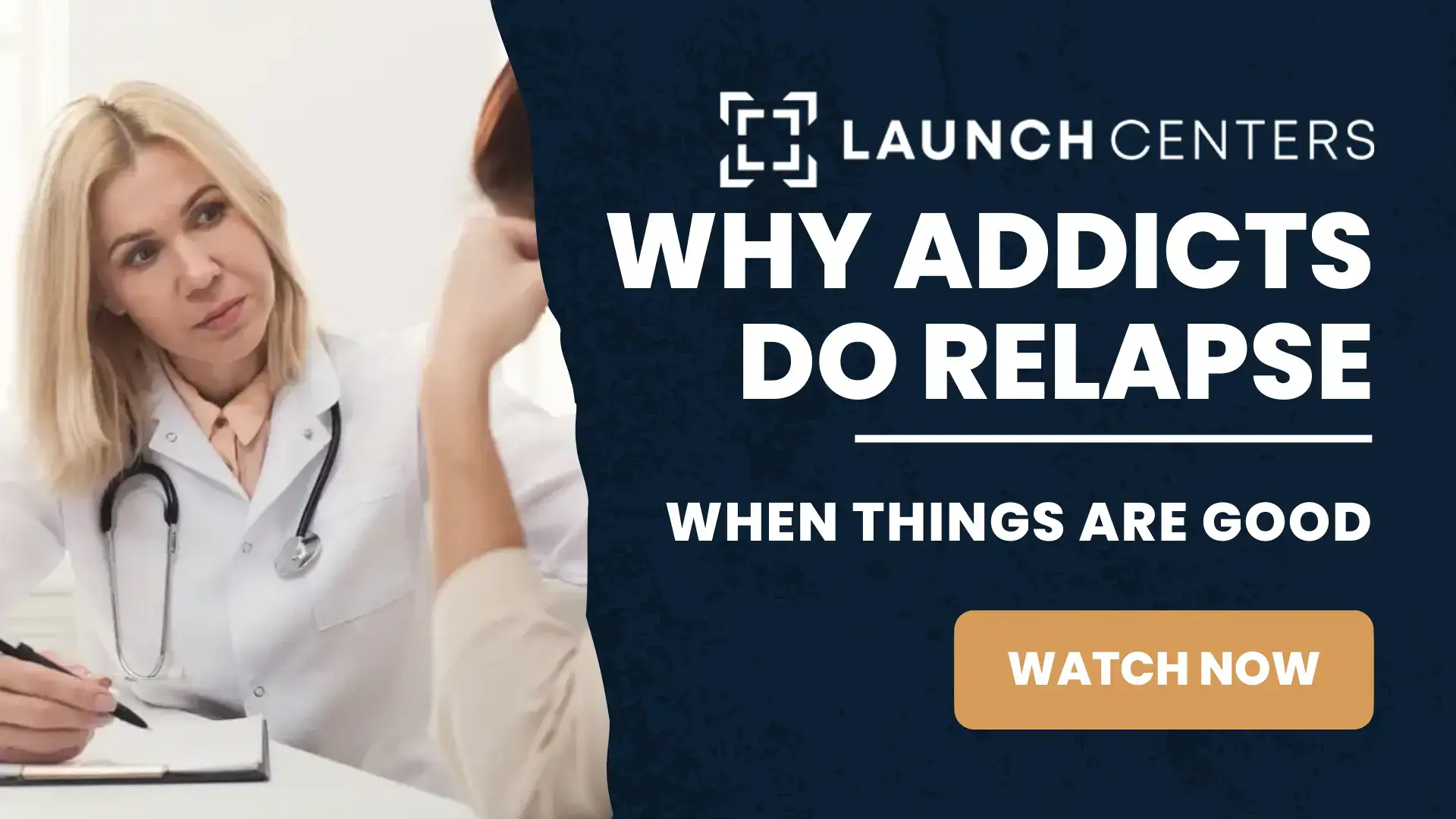Addiction is a relapsing disease that affects many people from all walks of life. Healing from addiction is an ongoing process, and relapse is a common challenge. Even after prolonged periods of sobriety, many addicts experience relapses, often when things appear to be going well.
By understanding the factors contributing to relapse and developing healthy coping mechanisms, recovering addicts can maintain sobriety and live fulfilling lives. It’s essential to remember that relapse is not a failure but rather a setback that can be overcome with perseverance and support.
But the question remains, “Why do addicts relapse when things are good?” Don’t worry; the Launch centers have got you covered!
In this article, you will learn the reasons why addicts may relapse, even when their lives seem to be on track. Let’s start reading!
Sober Living
Although not every candidate will qualify, it is a fantastic alternative after treatment. Coming back home in the same setting is rarely a wise course of action. One of the most important causes of relapse for addicts is their return home. In the first and most vulnerable phases of recovery, sober living enables persons in recovery to be held accountable and maintain connections with a recovering community.

What is Addicts Relapse?
Addicts relapse means a return to drug or alcohol use after sobriety. It is a common occurrence for people recovering from addiction. You know, addiction is a chronic disease that requires ongoing management and care. Many factors can contribute to addiction recovery.
It is important to address underlying issues. It is also necessary to develop healthy coping mechanisms to prevent relapse. This will help to maintain long-term sobriety. Seeking professional help and building a support network can also be effective strategies for preventing relapse.
Why Do Addicts Relapse When Things Are Good?
The two most typical causes of relapse for addicts when things are going well are 1) the fear of success and 2) the conviction that the symptoms caused the issue. Alcoholics and addicts frequently suffer dual dread of achievement and failure. Many drug users also struggle with poor self-esteem and rejection worries.

Some outcomes are people-pleasing actions and an unwillingness to let people in close. Some alcoholics and addicts think they are undeserving of love, intimacy, or remarkable experiences that result in success or consequences. The fear of failing or rejection results from how much they hate their uncomfortable sensations. As a result, individuals make an effort to prevent any failure that would serve to confirm these negative thoughts.
Factors That Contribute to Addiction Relapse:
Various factors can trigger a relapse. These are complacency, stress and anxiety, overconfidence, boredom, peer pressure, environmental cues, and personal issues. Let’s discuss each factor in-depth so you can better understand the influence of each element.
Complacency
Recovering addicts who become complacent in their recovery may stop doing the things that kept them sober, such as attending meetings or therapy sessions. This can leave them vulnerable to a relapse.
Stress and Anxiety
Stress and anxiety can be significant triggers for addiction relapse. When an addict feels like they can’t cope with their emotions, they may turn to drugs or alcohol for relief, leading to an addict relapsing.
Overconfidence
Some recovering addicts may feel overconfident in resisting cravings and temptation, leading them to let their guard down. This overconfidence can lead them to stop doing the things that helped them maintain sobriety.
Boredom
When a recovering addict does not have a purpose or engaging activities, it can be easy to fall back into old behavior patterns. To prevent addiction relapse due to boredom, finding fulfilling activities that provide a sense of purpose, joy, or challenge is crucial.

Peer Pressure
Being around friends or acquaintances who use drugs or alcohol can significantly trigger a relapse. Building a new social support network that supports sobriety is essential in reducing the risk of addiction relapse.
Environmental Cues
Environmental cues refer to the environmental factors that trigger memories associated with drug or alcohol use. These can include the sights, sounds, or smells that remind recovering addicts of their past substance abuse or drug addiction.
Personal Issues
Personal issues can include a range of emotional or psychological challenges. When these issues are left unaddressed, they can create a sense of emotional distress, leading to a desire to numb these feelings with drugs or alcohol.
The Importance of Addressing Underlying Issues
Addiction is often more than just a physical dependence on drugs or alcohol. It can also be a symptom of underlying emotional or psychological issues that must be addressed for long-term recovery. Without addressing these issues, recovering addicts may be at risk of relapse.
Mental Health Disorders
Co-occurring mental health disorders can make addiction relapse more likely. It’s crucial to address these issues as part of the recovery process.
Emotional Trauma
Many addicts struggle with unresolved emotional trauma that can make a recovery challenging. It can be difficult to maintain sobriety without addressing these underlying issues.
Chronic Pain and Other Physical Ailments
Chronic pain can lead to the misuse of prescription painkillers, eventually leading to addiction. Managing chronic pain appropriately is critical to avoiding relapse.
Strategies for Maintaining Sobriety
Maintaining sobriety after addiction recovery can be challenging. It requires various strategies to help recovering addicts stay on track and avoid relapse. By implementing the right strategy and being mindful of potential triggers, recovering addicts can achieve long-term sobriety.
Staying Mindful of Triggers
Being aware of triggers and developing healthy coping mechanisms can help prevent addiction relapse. This involves learning how to manage stress and other emotions without turning to drugs or alcohol.
Engaging in Healthy Activities
Engaging in healthy and fulfilling activities, such as exercise, hobbies, or volunteer work, can help prevent boredom and keep the mind focused on positive goals.
Building a Support Network
Recovering addicts can benefit from the support of peers, friends, and family members who understand addiction and recovery. Building a network of supportive people can help prevent relapse.
Continuing Treatment and Therapy
Even after achieving sobriety, continuing treatment and therapy can help prevent relapse. Therapy can help address underlying issues and provide support during challenging times.
Creating a Relapse Prevention Plan
Creating a plan for handling potential triggers and stressful situations can help prevent relapse. The plan should include coping strategies, emergency contacts, and steps to take if a deterioration does occur.
Experience Lasting Sober Living with Launch Centers
Addiction is a complicated disease that can influence every aspect of a person’s life, from physical health to emotional well-being and relationships. If you or someone you know is stumbling with addiction, seeking professional help is the first step toward recovery.
Sobriety is a gift that you give to yourself!
Do you need personalized treatment plans for addiction recovery?
Launch Centers offer to help those struggling with addiction achieve lasting sobriety in Los Angeles, California. We prioritize connectedness and purposefulness to support our clients in achieving long-term recovery. With the proper guidance, a healthy, fulfilling life in sobriety is within reach. If you or a loved one is battling addiction, we urge you to reach out to us and explore our program to find out how we can assist you.







